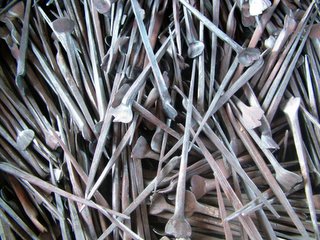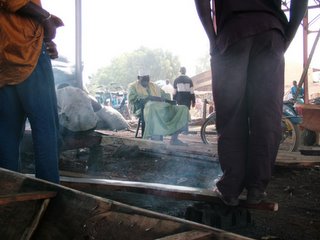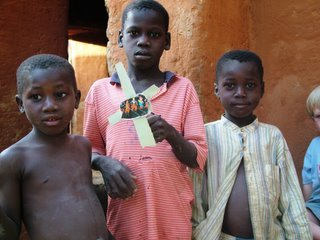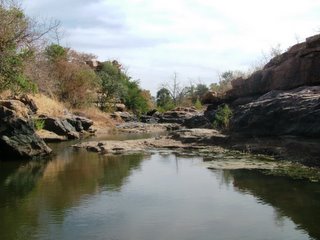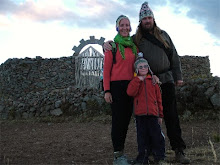Addendum to Djenne
December 12, 2005
A trek across Mali is a journey through time. It is as I would picture the Native Americans living their lives long before the white man made his presence known. Days slip slowly by under the hot Sahara sun. Fulani herders watch their cows, sheep, or goats, riding their bicycles to the fields, sleeping in the shade, walking their herds to market. Women wash clothes and themselves in the river, oblivious to the eyes of the Toubab zooming by in cars. Sleeping in mud huts, picking rice, fishing, gathering fire wood, scratching the Earth for whatever it will yield, and pausing for a jaw under the shade of the Acacia tree; this is the life of the Malian family.
Cars are few and far between. Many folks ride motorcycles. Many more ride ancient bicycles with rods for pedals and half the spokes missing. Still more walk or ride the donkey carts. No one is ever in much of a hurry. It is as if time has stood still here for eons.
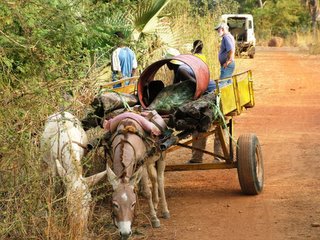 I admire the donkey. A strong animal, they assume their tasks with quiet resolve. They wander the streets searching for bits of food or lean against cool walls to rest. They work only as hard as necessary. The Malians, in turn, whip them mercilessly. They pile the carts high with cargo and then smack the hindquarters of their load bearer with a stick. The crack is loud and sharp and the donkey responds minimally, giving in little bit by little bit until the driver grows weary or the desired speed is attained, whichever comes first.
I admire the donkey. A strong animal, they assume their tasks with quiet resolve. They wander the streets searching for bits of food or lean against cool walls to rest. They work only as hard as necessary. The Malians, in turn, whip them mercilessly. They pile the carts high with cargo and then smack the hindquarters of their load bearer with a stick. The crack is loud and sharp and the donkey responds minimally, giving in little bit by little bit until the driver grows weary or the desired speed is attained, whichever comes first.
Many of the people I have met want nothing more then to come to America. They are sure that they will find their fortune there. Having seen it in movies and rap videos, they know that prosperity is waiting for them at the gates of New York. It would be fascinating to pluck a villager from his hut and place him in the Bronx. I can’t imagine a more overwhelming experience then that.
MJR
A trek across Mali is a journey through time. It is as I would picture the Native Americans living their lives long before the white man made his presence known. Days slip slowly by under the hot Sahara sun. Fulani herders watch their cows, sheep, or goats, riding their bicycles to the fields, sleeping in the shade, walking their herds to market. Women wash clothes and themselves in the river, oblivious to the eyes of the Toubab zooming by in cars. Sleeping in mud huts, picking rice, fishing, gathering fire wood, scratching the Earth for whatever it will yield, and pausing for a jaw under the shade of the Acacia tree; this is the life of the Malian family.
Cars are few and far between. Many folks ride motorcycles. Many more ride ancient bicycles with rods for pedals and half the spokes missing. Still more walk or ride the donkey carts. No one is ever in much of a hurry. It is as if time has stood still here for eons.
 I admire the donkey. A strong animal, they assume their tasks with quiet resolve. They wander the streets searching for bits of food or lean against cool walls to rest. They work only as hard as necessary. The Malians, in turn, whip them mercilessly. They pile the carts high with cargo and then smack the hindquarters of their load bearer with a stick. The crack is loud and sharp and the donkey responds minimally, giving in little bit by little bit until the driver grows weary or the desired speed is attained, whichever comes first.
I admire the donkey. A strong animal, they assume their tasks with quiet resolve. They wander the streets searching for bits of food or lean against cool walls to rest. They work only as hard as necessary. The Malians, in turn, whip them mercilessly. They pile the carts high with cargo and then smack the hindquarters of their load bearer with a stick. The crack is loud and sharp and the donkey responds minimally, giving in little bit by little bit until the driver grows weary or the desired speed is attained, whichever comes first.Many of the people I have met want nothing more then to come to America. They are sure that they will find their fortune there. Having seen it in movies and rap videos, they know that prosperity is waiting for them at the gates of New York. It would be fascinating to pluck a villager from his hut and place him in the Bronx. I can’t imagine a more overwhelming experience then that.
MJR














